Gardening in Hillside: Transforming Sloped Landscapes into Lush Gardens
Introduction to Hillside Gardening
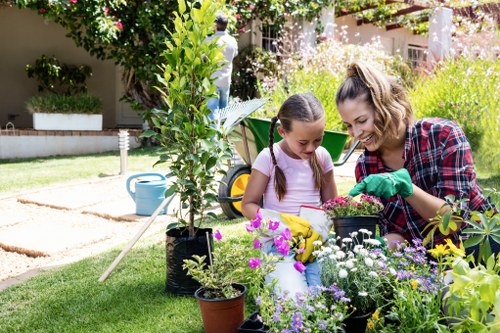
Gardening on a hillside presents unique challenges and opportunities. Unlike flat terrains, sloped landscapes require careful planning and specialized techniques to ensure plants thrive. Whether you're a seasoned gardener or a beginner, understanding the nuances of hillside gardening can help you create a beautiful and sustainable outdoor space.
One of the primary considerations in hillside gardening is soil stability. Slopes are prone to erosion, which can wash away topsoil and nutrients essential for plant growth. Implementing effective erosion control measures is crucial to maintaining a healthy garden.
Moreover, choosing the right plants that can adapt to the varying conditions of a hillside is imperative. Plants with strong root systems are particularly beneficial as they help anchor the soil and prevent erosion.
Planning Your Hillside Garden
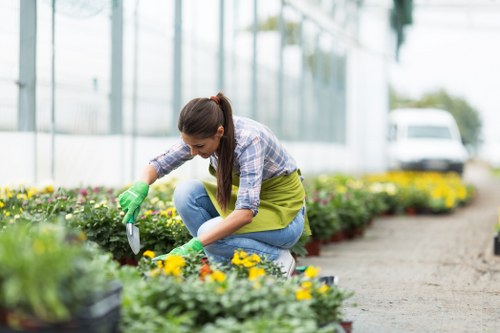
Before diving into planting, it's essential to plan your hillside garden meticulously. Start by assessing the sun exposure, drainage patterns, and soil composition of your slope. This information will guide your plant selection and garden layout.
Creating terraces or retaining walls can help manage the slope effectively. Terracing not only reduces erosion but also creates level areas that are easier to garden on. Retaining walls provide structural support and can be built using various materials like stone, brick, or wood.
Additionally, incorporating pathways and access routes ensures that you can navigate your hillside garden with ease. This enhances the overall functionality and aesthetic appeal of the space.
- Assess sun exposure and drainage
- Create terraces or retaining walls
- Choose appropriate plants for slopes
- Incorporate pathways for accessibility
Soil Preparation and Erosion Control
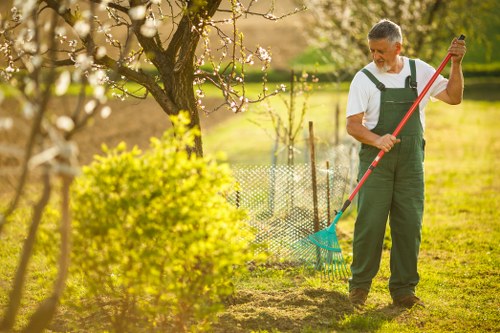
Soil preparation is a critical step in hillside gardening. Start by testing your soil to determine its pH level and nutrient content. Amending the soil with compost or organic matter can improve its fertility and structure, making it more conducive to plant growth.
Implementing erosion control measures is equally important. Techniques such as mulching, installing ground covers, and building terraces help stabilize the soil. Plants with deep and extensive root systems are particularly effective in holding the soil together.
Additionally, incorporating drainage systems like French drains or swales can manage excess water flow, reducing the risk of soil erosion during heavy rains.
- Test and amend soil
- Use mulch and ground covers
- Plant erosion-resistant vegetation
- Install proper drainage systems
Choosing the Right Plants for Hillside Gardens
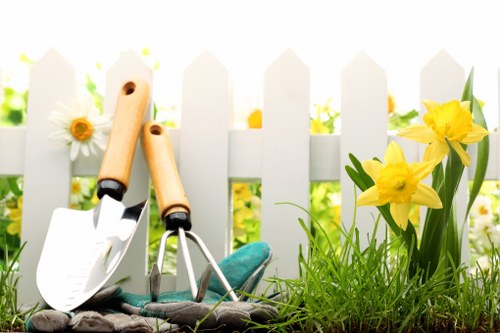
Selecting plants suited for hillside conditions is paramount. Opt for species that are drought-tolerant and have strong root systems. Native plants are often an excellent choice as they are adapted to the local climate and soil conditions.
Perennials, shrubs, and groundcovers are ideal for sloped areas. They provide year-round beauty and help maintain soil stability. Incorporating a variety of plant heights and textures can add depth and visual interest to your garden.
Consider the microclimates within your slope. Different areas may receive varying amounts of sunlight and moisture, allowing you to create diverse planting zones tailored to each microclimate.
- Choose native and drought-tolerant plants
- Incorporate perennials and shrubs
- Use groundcovers to prevent erosion
- Create diverse planting zones
Irrigation Solutions for Sloped Gardens
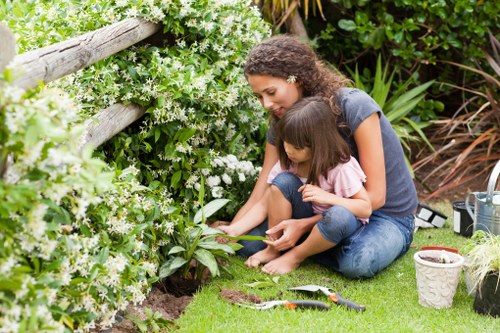
Effective irrigation is crucial for hillside gardens, as water distribution can be uneven on slopes. Drip irrigation systems are highly recommended as they deliver water directly to the plant roots, minimizing waste and runoff.
Implementing a rainwater harvesting system can also be beneficial. Collecting and storing rainwater reduces dependency on municipal water sources and provides a sustainable irrigation solution.
Mulching around plants can help retain moisture, reducing the need for frequent watering. Additionally, grouping plants with similar water needs together ensures efficient irrigation management.
- Install drip irrigation systems
- Consider rainwater harvesting
- Use mulch to retain moisture
- Group plants by water requirements
Maintenance Tips for Hillside Gardens
Maintaining a hillside garden requires regular upkeep to ensure its health and beauty. Regularly inspect your plants for signs of stress or disease, addressing issues promptly to prevent spread.
Pruning shrubs and trees helps maintain their shape and encourages healthy growth. It also improves air circulation, reducing the risk of fungal diseases.
Weeding is essential to minimize competition for nutrients and water. Mulching can aid in reducing weed growth by blocking sunlight and creating a barrier.
- Regular plant inspections
- Prune for health and shape
- Control weeds effectively
- Monitor soil moisture levels
Local Expertise: Gardening Services in Hillside Area
For those seeking professional assistance, numerous gardening services specialize in hillside landscaping. These experts understand the unique challenges of sloped gardens and can offer tailored solutions to meet your needs.
Hiring local gardeners ensures that your garden is designed with the regional climate and soil conditions in mind. They can provide valuable insights and techniques to enhance the sustainability and aesthetics of your hillside garden.
Whether you're looking to start from scratch or revamp an existing garden, consulting with local gardening professionals can save you time and effort, ensuring a successful gardening experience.
- Expert soil analysis and amendment
- Customized garden design
- Professional planting and installation
- Ongoing maintenance services
Eco-Friendly Practices in Hillside Gardening
Incorporating eco-friendly practices into your hillside garden not only benefits the environment but also promotes a healthier garden ecosystem. Sustainable gardening techniques help conserve resources and reduce your garden's carbon footprint.
Using organic fertilizers and pesticides minimizes the impact of chemicals on the surrounding environment. Composting kitchen and garden waste creates a natural fertilizer, enriching the soil without harmful additives.
Additionally, choosing native plants supports local biodiversity, providing habitat and food sources for pollinators and other beneficial organisms.
- Utilize organic fertilizers and pesticides
- Implement composting practices
- Choose native and biodiversity-supporting plants
- Conserve water through efficient irrigation
Seasonal Gardening Tips for Hillside Areas
Each season brings its own set of challenges and opportunities for hillside gardening. Adapting your gardening practices to seasonal changes ensures year-round garden health and vibrancy.
In spring, focus on planting new species and preparing the soil for growth. Mulching helps retain soil moisture as temperatures rise.
Summer requires diligent watering and shade management to protect plants from intense heat. Implementing drip irrigation and installing shade cloths can help mitigate extreme conditions.
- Spring: Planting and soil preparation
- Summer: Watering and shade management
- Autumn: Harvesting and composting
- Winter: Protecting plants from frost
Harvesting and Enjoying Your Hillside Garden
The ultimate reward of hillside gardening is enjoying the fruits and beauty of your labor. Harvesting produce from your garden provides fresh, homegrown ingredients for your kitchen.
Additionally, a well-maintained hillside garden serves as a tranquil retreat, offering a space for relaxation and reconnecting with nature. Incorporate seating areas and decorative elements to enhance the garden's serenity and functionality.
Hosting gatherings or simply spending quiet afternoons in your garden can greatly enhance your quality of life, making all the effort put into hillside gardening worthwhile.
- Harvest fresh produce
- Create relaxing seating areas
- Enhance garden aesthetics with decorations
- Enjoy the therapeutic benefits of gardening
Nearby Areas with Exceptional Gardening Opportunities
Hillside gardening in this region is complemented by several nearby areas that offer unique gardening opportunities and services.
- Maple Ridge: Just 5 miles from Hillside, Maple Ridge is known for its vibrant community gardens and annual gardening fairs.
- Greenfield: Located 7 miles away, Greenfield boasts extensive nurseries and specialist gardening stores.
- Oakwood: At 3 miles from Hillside, Oakwood features beautiful sloped parks ideal for hillside gardening projects.
- Pine Valley: 10 miles away, Pine Valley offers workshops on sustainable hillside gardening techniques.
- Brookside: Situated 8 miles from Hillside, Brookside is renowned for its rich soil and diverse plant species.
- Sunnyvale: 6 miles distant, Sunnyvale provides excellent resources for drought-resistant plants suitable for slopes.
- Riverside: 4 miles from Hillside, Riverside is popular for its water-efficient irrigation solutions.
- Evergreen: Located 9 miles away, Evergreen is home to several eco-friendly gardening initiatives and organizations.
- Silver Lake: At 2 miles distance, Silver Lake offers stunning landscape inspirations for hillside gardens.
- Willow Creek: 11 miles from Hillside, Willow Creek specializes in native plant gardens and conservation efforts.
- Birchwood: Situated 12 miles away, Birchwood provides expert gardening consultation services tailored to sloped terrains.
- Cedar Hill: 1 mile from Hillside, Cedar Hill features picturesque gardens perfect for drawing inspiration.
- Whispering Pines: 13 miles distant, Whispering Pines offers a serene environment ideal for contemplative gardening.
- Crystal Springs: Located 14 miles away, Crystal Springs is known for its innovative gardening technologies and products.
- Meadowbrook: At 15 miles from Hillside, Meadowbrook hosts annual horticultural exhibitions showcasing hillside gardening successes.
Conclusion: Embrace the Beauty of Hillside Gardening
Gardening in Hillside combines the art of landscaping with the science of soil management, offering a rewarding experience for those willing to invest time and effort. By understanding the unique challenges of sloped terrains and implementing effective strategies, you can create a thriving and aesthetically pleasing garden.
Embrace the beauty and serenity that hillside gardening offers, transforming your sloped landscape into a lush, sustainable oasis. Whether you're enhancing your home's curb appeal or creating a personal retreat, hillside gardening is a fulfilling endeavor that brings nature closer to you.
Ready to transform your hillside? Contact us today to consult with our gardening experts and begin your journey towards a beautiful hillside garden.
Get Started with Your Hillside Garden Today
Don't wait any longer to turn your hillside into a stunning garden paradise. With the right planning, plant selection, and maintenance practices, your sloped landscape can flourish.
Whether you're seeking to create a vibrant flower garden, a productive vegetable patch, or a serene green space, our team is here to help. We offer comprehensive hillside gardening services tailored to your specific needs and preferences.
Book your service now and take the first step towards a beautiful and sustainable hillside garden.
